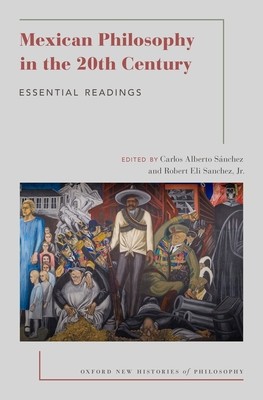
- We will send in 10–14 business days.
- Publisher: Oxford University Press, USA
- ISBN-10: 0190601302
- ISBN-13: 9780190601300
- Format: 15.5 x 23.1 x 2 cm, minkšti viršeliai
- Language: English
- SAVE -10% with code: EXTRA
Mexican Philosophy in the 20th Century (e-book) (used book) | bookbook.eu
Reviews
Description
Sánchez and Sanchez have selected, edited, translated, and introduced some of the most influential texts in Mexican philosophy, which constitute a unique and robust tradition that will challenge and complicate traditional conceptions of philosophy. The texts collected here are organized chronologically and represent a period of Mexican thought and culture that emerged from the Mexican Revolution of 1910 and which culminated in la filosofÃa de lo mexicano (the philosophy of Mexicanness). Though the selections reflect on a variety of philosophical questions, collectively they represent a growing tendency to take seriously the question of Mexican national identity as a philosophical question--especially given the complexities of Mexico's indigenous and European ancestries, a history of colonialism, and a growing dependency on foreign money and culture. More than an attempt to describe the national character, however, the texts gathered here represent an optimistic period in Mexican
philosophy that aimed to affirm Mexican culture and philosophy as a valuable, if not urgent, contribution to universal culture.
EXTRA 10 % discount with code: EXTRA
The promotion ends in 23d.08:54:21
The discount code is valid when purchasing from 10 €. Discounts do not stack.
- Publisher: Oxford University Press, USA
- ISBN-10: 0190601302
- ISBN-13: 9780190601300
- Format: 15.5 x 23.1 x 2 cm, minkšti viršeliai
- Language: English English
Sánchez and Sanchez have selected, edited, translated, and introduced some of the most influential texts in Mexican philosophy, which constitute a unique and robust tradition that will challenge and complicate traditional conceptions of philosophy. The texts collected here are organized chronologically and represent a period of Mexican thought and culture that emerged from the Mexican Revolution of 1910 and which culminated in la filosofÃa de lo mexicano (the philosophy of Mexicanness). Though the selections reflect on a variety of philosophical questions, collectively they represent a growing tendency to take seriously the question of Mexican national identity as a philosophical question--especially given the complexities of Mexico's indigenous and European ancestries, a history of colonialism, and a growing dependency on foreign money and culture. More than an attempt to describe the national character, however, the texts gathered here represent an optimistic period in Mexican
philosophy that aimed to affirm Mexican culture and philosophy as a valuable, if not urgent, contribution to universal culture.


Reviews